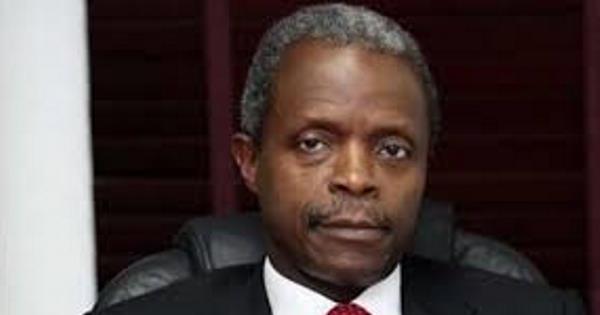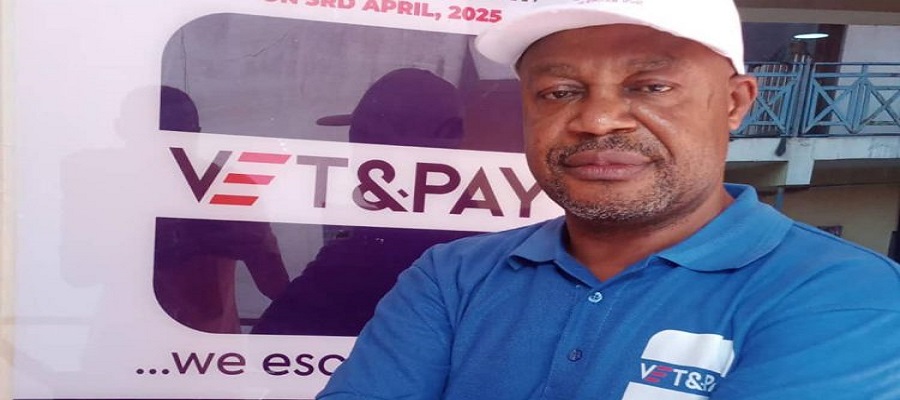E-Financial
Osinbajo Tasks Banks on Transformation Projects

Vice President Yemi Osinbajo yesterday tasked the banking and finance sector to take on more transformative projects such as housing and renewable energy, among others, in ways that will significantly impact job creation and poverty reduction.

Prof Osinbajo stated this at the opening session of the 14th Annual Banking and Finance Conference themed “Economic Recovery, Inclusion, and Transformation, the role of Banking and Finance”,
He noted that the banking and finance sector has over the years played significant roles in the economy.
President Muhammadu Buhari had earlier declared the conference opened and his Rwandan counterpart, Paul Kagame also delivered the keynote address.
According to the Vice President, “it is time for the sector to take on some of the transformative big-ticket items that would fundamentally transform our economy. Such matters include consumer finance but housing finance in particular.”
He noted that a focus on how to finance housing is critical.
Referencing an African Development Bank (AfDB) survey, Prof. Osinbajo said “the housing sector may support poverty reduction and inclusive growth in two general ways. First, housing construction contributes to economic output, creates employment, and generates a demand for materials and related services. Second, improved housing raises the standard of living of occupants.
“That study (AfDB survey) says for example that the benefits of housing for individuals accrue in large part through better health and sanitation, and of course this improves the overall human capacity of our citizens who are able to own these houses. Housing also generates large multiplier effects in terms of employment and output. Employment is created for both skilled and poorer, unskilled workers.
“The evidence also suggests that there is a symbiotic relationship between housing finance and financial sector development. Housing finance helps to develop the financial sector itself and helps to contribute to economic growth. So, these were the justifications that we also advanced for our mass housing initiative in the Economic Sustainability Plan.”
Challenging the banking sector on participating in the Federal Government’s Mass Housing programme, the VP noted that “the finance sector appears shy or simply has not found the right housing finance model that will work.”
On renewable energy and mitigating the impact of climate change, Prof. Osinbajo said “one of the chief considerations especially for developing countries is how to pay for the massive transition to renewable energy. How do we pay for moving from where we are especially fossil fuel-based power sources to renewable energy? This is a significant challenge but it is also an enormous opportunity.”
Citing the example of the Federal Government’s solar power initiative, Prof. Osinbajo decried the low interest shown by Commercial Banks to catalyze installations or manufacturing for the Solar Power Naija programme.
He explained that “the challenge of under-electrification of the rural and poor and its associated impacts on our economic well-being and security cannot be overstated. The climate change challenge is a massive one in more ways than we can imagine.
“I would like to encourage the Bankers Committee to refocus on supporting the Solar Power Naija to ensure that in the next few months we can catalyze access to the N140 billion and create 5 million connections that can multiply to eliminating our electricity access deficit and creating jobs.”
While commending the sector for its efforts in improving service delivery over the years, the VP noted that “going forward, the banking and finance sector must take advantage of the new opportunities that are opening up and also adapt to domestic and international developments.
“The rapid changes in the technology sector mean that financial technology companies and payment service companies are now an inescapable part of the banking and financial landscape.”
Prof Osinbajo also suggested that financial inclusion being critical to the objectives of recovery, inclusion and transformation, should be prioritized “especially in this COVID era, for the poor and more vulnerable sections of society so that they can keep their micro-businesses alive and handle risks and uncertainty.”
Other dignitaries who spoke at the event include Governor Babajide Sanwo-Olu of Lagos State; Governor of the Central Bank of Nigeria, Godwin Emefiele, and President of the Chartered Institute of Bankers (CIBN), Mr Bayo Olugbemi, among other bank executives across the country with several participants also joining virtually.
E-Financial
TCL Launches ‘vetandpay’ to Combat Online Transaction Fraud

Tradewyse Concepts Limited (TCL), Nigeria-based technology solution provider has launched a product called “vetandpay” to address the issues of trust and fraud in online business transactions in the country.

Dr Kalu Ibe, founder and chief executive officer, Tradewyse Concepts Limited
Dr Kalu Ibe, founder and chief executive officer, Tradewyse Concepts Limited, stated that the software was proudly developed by a team of Nigerians.
Speaking at the product dedication ceremony in Abuja, Ibe explained that the app aims to reduce corruption by restoring trust and integrity. He added that it would inspire confidence in both business and the broader transactional environment in Nigeria.
“Today, I present vetandpay.ng, powered by Vetandpay Technologies Ltd, Africa’s foremost escrow company, a subsidiary of TCL,” Ibe said.
“What started as a spark two years ago is now shining brightly over Nigeria’s transactional space, bringing healing with its rays.”
He outlined the various escrow services offered, including auto purchase escrow, procurement escrow, service-based escrow, e-commerce escrow, and property escrow, with more services expected to be added.
Ibe emphasised that the service is available to Nigerians both at home and abroad, promising zero losses in all business transactions when using vetandpay.
Through its Corporate Social Responsibility (CSR) programme, TCL plans to initiate a comprehensive tech training programme for teenagers in Nigerian schools. Ibe highlighted that the initiative aims to equip young people with technological skills, preparing them to enter the digital economy and drive innovation.
Ntufam Ugbo, project director, commented that vetandpay is transforming the business landscape in Nigeria by building trust between buyers and sellers.
“What vetandpay does is act as a middleman between the buyer and the seller,” she said.
Mrs Rachel Samuel, head of Customer Service at vetandpay, described the platform as a secure payment solution designed to eliminate fraud in online transactions.
“Our basic goal is to address the issue of receiving something different from what was ordered,” she explained.
Referring to a report by the Federal Trade Commission, Samuel pointed out that consumers lost over 8.8 billion dollars to fraud in 2022, a 30 per cent increase from the previous year. She noted that with vetandpay, both parties to a business transaction could have peace of mind and zero losses.
She encouraged Nigerians to embrace the services provided by the platform by downloading the vetandpay app and using the technology to secure their transactions.
‘‘Today marks the beginning of a new era in secure online transactions. Whether you are a business owner, freelancer, or everyday buyer, vetandpay is here to protect your hard-earned money,” Samuel concluded.
E-Financial
FG Asks World Bank for Fresh $10.50m Loan to Enhance CBN Technical Capacity

Nigeria has approached the World Bank for a fresh $10.50m loan to enhance the Central Bank of Nigeria’s (CBN) technical capacity and modernise the country’s domestic payment infrastructure.

Olayemi Cardoso, Governor, Central Bank of Nigeria
According to information on the World Bank website on Thursday, the proposed CBN Technical Assistance Facility seeks to support integrating innovative technologies and data science into the CBN’s supervisory processes.
This is expected to help the apex bank tackle long-standing and emerging challenges in Nigeria’s rapidly evolving financial landscape while improving the domestic payment infrastructure for remittances.
The project, currently at the concept review stage, will focus on three key areas. Firstly, it aims to strengthen the CBN’s institutional capacity to keep pace with technological advancements through a robust governance framework, expert advisory support, peer-to-peer central bank exchanges, and modernisation of the CBN’s internal processes to align with the digital era.
Secondly, it will enhance the CBN’s supervisory capacity through technology and data improvements. This involves funding modern technical solutions, including Supervisory Technology systems, to improve data accuracy, operational efficiency, and risk-based supervision.
Thirdly, it aims to modernise domestic payment systems for remittances to improve their safety and reliability.
It will explore innovative methods to attract informal remittance flows into formal channels while conducting annual surveys on remittance households and fostering peer-to-peer learning for knowledge exchange.
According to the World Bank, the objective of this project is “to strengthen technology-enabled, data-driven, risk-based supervision at the CBN and improve domestic payment infrastructure for remittances in Nigeria.”
The project aligns with the government’s pursuit of a cashless economy and the increasing adoption of digital financial services in Nigeria.
The scheme, which has a commitment amount of $10.50m, is scheduled for board presentation approval on June 12, 2025. The implementing agency is the Central Bank of Nigeria.
E-Financial
Sterling Bank Makes Online Transfer Charges Free of Charge

Sterling Bank has called for the cancellation of bank transfer fees by major banks, announcing it will no longer take any money for itself for any local online transactions by its customers.

The announcement, made on April 1st, initially sparked widespread arguments, with many assuming it was a marketing prank tied to April Fools’ Day.
However, Sterling Bank, in a statement, has confirmed that it is not a stunt, that the zero-transfer-fee policy was real, and effective immediately.
With this move, Sterling becomes the first major Nigerian bank to take a definitive stand against the long-standing practice of charging customers for everyday digital transfers, an issue that has grown increasingly contentious as digital banking adoption deepens.
“We believe access to your own money shouldn’t come with a penalty,” said Obinna Ukachukwu, growth executive leading the Consumer and Business Banking Directorate, Sterling Bank
“This is more than a financial decision, it’s a values-based one. It reflects our commitment to making banking fair, inclusive, and truly customer focused.
“We’re not yet the biggest bank in Nigeria, but we’ve been the boldest,” Ukachukwu added.
“Sterling fearlessly believes in the future of Nigeria, and this is us backing Nigerians with more than words,” it sated.
Under the new policy, Sterling customers will enjoy free transfers for all local transactions conducted via the bank’s mobile app. This translates into significant savings, particularly for individuals and new small business owners who make frequent daily transfers.
The bank’s latest move has been met with widespread public approval, sparking positive reactions across social media and placing pressure on industry peers to follow suit.
We’re proud to lead this change,” Ukachukwu added. “We hope it inspires others to think differently about what customers truly need from their banks, not just in services, but in values.”

 Telecom3 days ago
Telecom3 days agoMafab Communications Has Launched 5G Services- Findings

 Broadcasting3 days ago
Broadcasting3 days agoBurna Boy, Other Nigerian Artists Pocket $38m from Spotify in 2024

 E-Business3 days ago
E-Business3 days agoEquinix Launches LG2.3 Data Centre in Nigeria

 E-Business3 days ago
E-Business3 days agoDHL Signs MoU with Temu to Drive Sustainable Supply Chain Solutions for SMEs

 E-Business3 days ago
E-Business3 days agoMicrosoft Marks 50th Anniversary with Major Copilot AI Update

 Telecom3 days ago
Telecom3 days agoSophos Reveals Key Findings: 56% of Cyberattacks Exploit Valid Credentials

 E-Financial3 days ago
E-Financial3 days agoTCL Launches ‘vetandpay’ to Combat Online Transaction Fraud

 E-Business3 days ago
E-Business3 days agoReport Suggests a Slash in Mobile App Usage By 2027 Due to AI Assistants

























